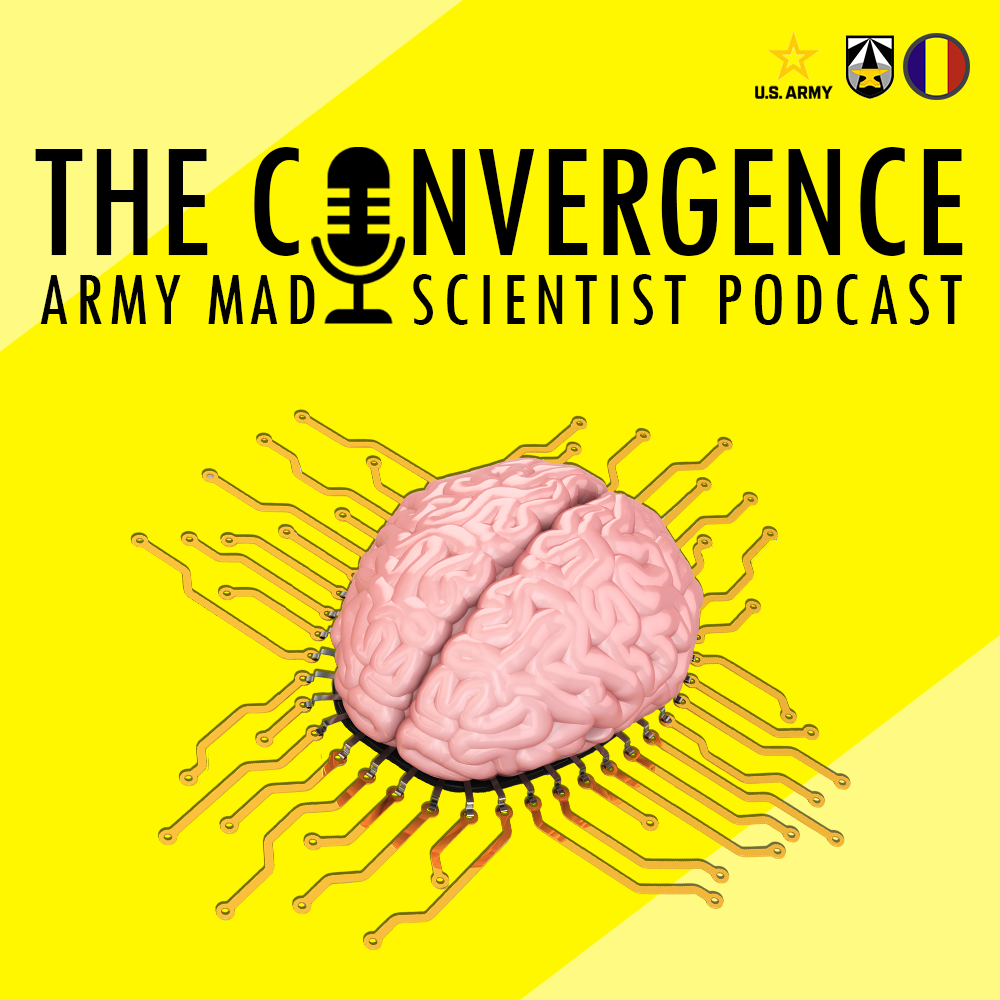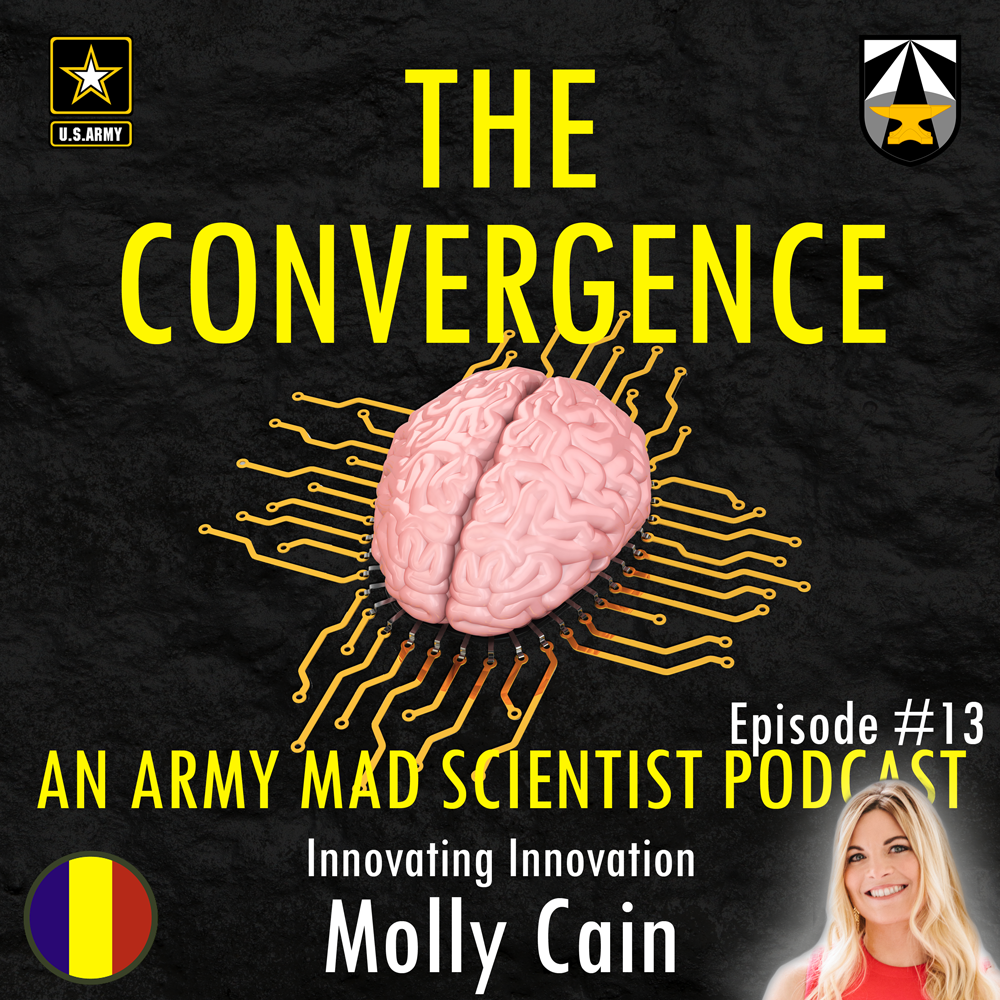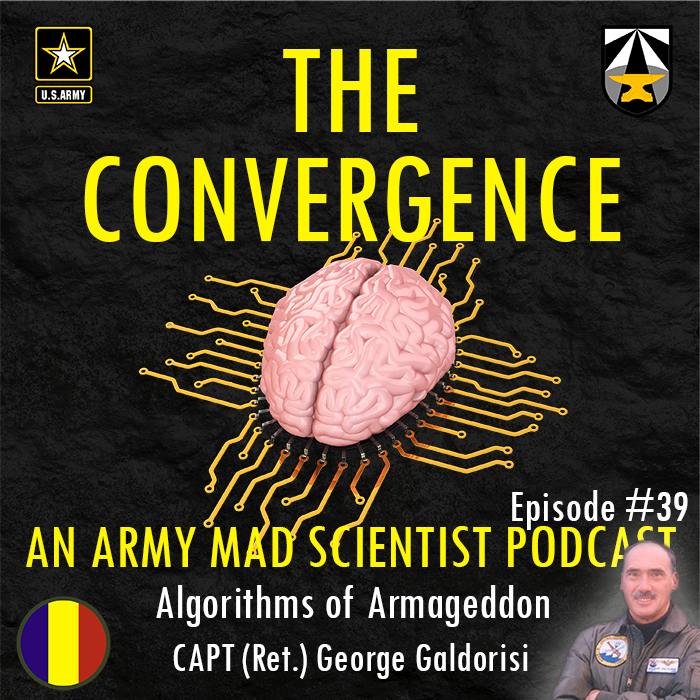[Editor’s Note: Large language models like ChatGPT — democratizing the power of artificial intelligence — have rocked industry and academia with their potential to revolutionize how humans process vast quantities of information and generate content. Our Federal Government, including the Department of Defense and its
constituent Services, will similarly be transformed as myriad processes begin to harness this capability to augment traditionally human endeavors. But this sea change will require work force flexibility and a willingness to learn and adapt to new ways of accomplishing mission requirements. Changing culture is hard…
Army Mad Scientist is pleased to present our latest episode of The Convergence podcast, featuring LTC Robert Solano, Commander of the Defense Contract Management Agency (DCMA) at Boeing in Mesa, Arizona, discussing what DCMA does, how language models like ChatGPT can help the Army and the Nation’s industrial base work together, and some of the challenges and barriers these language models may face when it comes to wide-spread adoption in the Department of Defense (DoD) — Enjoy!]
[If the podcast dashboard is not rendering correctly for you, please click here to listen to the podcast.]
LTC Robert Solano is an accomplished Army officer and the Commander of the Defense Contract Management Agency (DCMA) at Boeing in Mesa, Arizona. With 19 years of experience under his belt, LTC Solano has a passion for delivering quality aircraft and parts to support Warfighters while making a difference in the acquisition community. As a senior Army Aviator and Acquisition Corps officer with multiple combat deployments to Iraq and Afghanistan, LTC Solano has honed his skills in organizational leadership, program management, and government contracting. As an engineer, he is skilled in artificial intelligence, augmented reality, aviation systems, and advanced weapons systems development. His impressive career has taken him to work at the Army Artificial Intelligence Integration Center, Palantir
Technologies, U.S. Special Operations Command, and other procurement and aviation units. LTC Solano holds a Bachelor’s Degree in Mechanical Engineering from the United States Military Academy at West Point, a Master’s Degree in Aerospace Engineering from the Georgia Institute of Technology, and a Master’s Certificate in Aviation Doctoral Studies (ABD) from Embry-Riddle Aeronautical University.
In today’s podcast, LTC Solano discusses what DCMA does, how language models like ChatGPT can help the Army and the Nation’s industrial base work together, and some of the challenges and barriers these language models may face when it comes to wide- spread adoption in the DoD. The following bullet points highlight key insights from our discussion:
The Defense Contract Management Agency (DCMA) has over 11,000 personnel throughout the
world. These personnel are on the factory floors, looking over the shoulders of the contractors who are designing and manufacturing materiel for the warfighter. They ensure end items are built to standard, at cost, and delivered on time.
ChatGPT, and other large language models, are artificial intelligence (AI) programs that are fed a large body of data (books, Tweets, articles, etc.) from which they can derive meaning and draw conclusions.
For example, you can ask ChatGPT, “Why is the sky blue?” and it will respond
with the science behind light refracting through the atmosphere. These programs are so advanced that you can even follow up your original question by asking the system to elaborate in simpler terms. The system will remember what it told you and use simpler language and more illustrative analogies to further explain its responses.
Large language models can be used to craft arguments for articles, blog posts, academic papers, and even the questions for this podcast. They are much more than just a data aggregator, as they are able to summarize important points; interpret policy, doctrine, or legal terminology; create original proposals; and communicate clearly with proper formatting, grammar, and tone.
Using large language models can significantly increase productivity for a variety of jobs, skillsets, and Military Occupational Specialties (MOSs). ChatGPT, for example, can ease the burden for analysts, writers, contracting officers, and others by quickly completing certain tasks, freeing up the individual to do things that humans do best.
These systems are user-friendly consumer products that don’t require any technical
skill to operate (no special coding, programming, or AI knowledge is needed). Their interface responds to natural language inputs and replies in plain and understandable text. ChatGPT has been the fastest growing consumer product in history.
Contracting is a vital component of acquisition, logistics, and support services for the Army. The contracting process involves industry responding to government requests for proposals, crafting submissions to specific performance work statement language, and competitive proposal evaluations. Using large language models could exponentially improve productivity for small businesses trying to work with the government who don’t have the same resources that larger defense contractors do — lowering the barrier for entry, leveling the playing field, and allowing more non-traditional vendors to compete.
However, this may lead to an “arms race” where companies with the best large language model or AI system are marginalizing the competition and small businesses are once again facing a substantial barrier instead of the Government getting the best value.
Stay tuned to the Mad Scientist Laboratory for our next episode of The Convergence on 18 May 2023 where we interview “Chatty Cathy” (an instantiation of ChatGPT) about the future of warfare, how our adversaries are planning to compete and win in the operational environment, and how emergent technologies could converge to provide new capabilities!
If you enjoyed this post, check out the following related content:
Artificial Intelligence: An Emerging Game-changer
Takeaways Learned about the Future of the AI Battlefield
The Guy Behind the Guy: AI as the Indispensable Marshal, by Brady Moore and Chris Sauceda
There Will Be Data and associated podcast, with Inderpal Bhandari
Crossing the Valley of Death for Innovation and associated podcast, with Trish Martinelli and David Schiff
Achieving an AI-era Workforce by 2025: A Modern, Scalable Approach to Retooling the United States (and its Army!) by Ted Hallum
Algorithms of Armageddon and associated podcast, with proclaimed Mad Scientist CAPT (Ret.) George Galdorisi
The Language of AI and associated podcast, with Michael Kanaan
AI Across the Enterprise and associated podcast, with Rob Albritton
Bringing AI to the Joint Force and associated podcast, with Jacqueline Tame, Alka Patel, and Dr. Jane Pinelis
Integrating Artificial Intelligence into Military Operations, by Dr. James Mancillas
“Own the Night” and the associated Modern War Institute podcast with proclaimed Mad Scientist Mr. Bob Work
Disclaimer: The views expressed in this blog post do not necessarily reflect those of the
U.S. Department of Defense, Department of the Army, Army Futures Command (AFC), or Training and Doctrine Command (TRADOC).

[Editor’s Note: Army Mad Scientist continues to explore issues impacting the Operational Environment, especially those directly affecting U.S. Army operations in the contemporary battlespace....

In this latest episode of “The Convergence,” we talk with Molly Cain, founder of GovCity, the Nation’s first disruption and culture accelerator focused on...

CAPT George Galdorisi (USN-Ret.) is a career naval aviator whose thirty years of active duty service included four command tours and five years as...